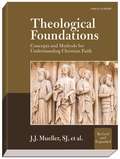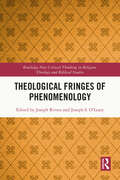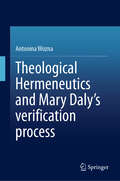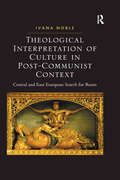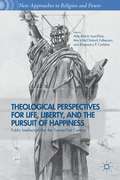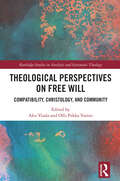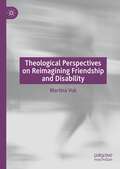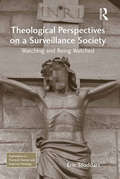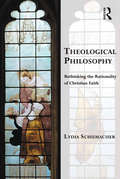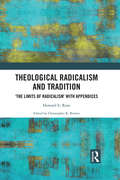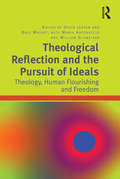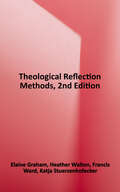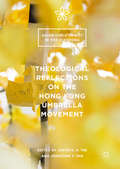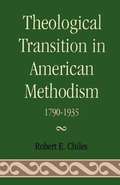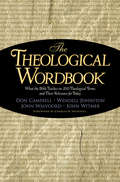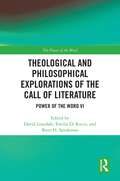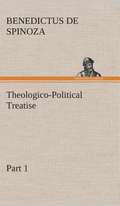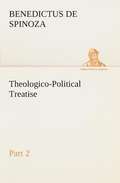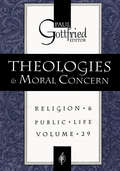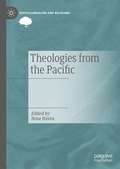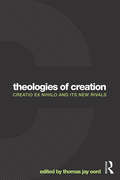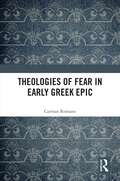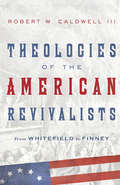- Table View
- List View
Theological Foundations: Concepts and Methods for Understanding Christian Faith (Revised and Expanded Edition)
by J. J. MuellerThis book is about how to successfully study theology and provides a solid foundation for a theological discussion.
Theological Fringes of Phenomenology (Routledge New Critical Thinking in Religion, Theology and Biblical Studies)
by Joseph Rivera Joseph S. O’LearyThis book focuses on the relationships between phenomenology and theology, which have been varied and complex but seem currently in an inconclusive and loosely defined state. Methodological rigor is not much in evidence, and the two disciplines continue to defy any authoritative synthesis. While both disciplines grapple with questions concerning the fundamental structures of human experience, their relationship is troubled by the elusive roles of Revelation and faith, which threaten the scientific autonomy of philosophy on one side and disable theologians for consistent philosophical discourse on the other. This volume revisits that conundrum from various perspectives, as it at once repristinates some of the most vibrant points of encounter and opens possibilities for new beginnings. It begins with the theological musings into which leading phenomenologists have been drawn from the start, with special reference to Husserl, Heidegger, and Michel Henry, as well as backward glances to Fichte, Schelling, and Blondel. A second section takes up specific theological themes and examines how phenomenological approaches can refine thinking on them. These include the Incarnation, the Resurrection, the Eucharist, Grace, and Prayer. A dialogue between phenomenology and classical theologians is staged in the third section: Augustine, Pseudo-Dionysius, Eckhart, and Karl Rahner. The closing section ranges more widely, discussing atheism, non-realist theology, and Hinduism from phenomenological angles, and showing how these topics too come within the ambit of theology.
Theological Hermeneutics and Mary Daly's verification process
by Antonina WoznaTheological Hermeneutics and Daly's verification process offers an original overview of Mary Daly’s inputs to the theological hermeneutics from the feminist perspective. In the context of multiple theological methodologies and a growing interest for gender and feminist studies, it provides keys to design relevant approach to theology as a method. This book shows how gender bias affects theological discourses and how gender discourse oriented to the good of women, can be a paradigm of theology and a criterion of the most effective transmission of faith and social transformation. This book is an important read for scholars working in the intersection of theology, gender and feminism, and a great addition to Antonina Wozna's book on Mary Daly’s (1928-2010) Theological Method of Ontolinguistic Hermeneutics.
Theological Interpretation of Culture in Post-Communist Context: Central and East European Search for Roots
by Ivana NobleTwenty years after the fall of Communism in Central and East Europe is an ocassion to reevaluate the cultural and theological contribution from that region to the secularization - post-secularization debate. Czech theologian Ivana Noble develops a Trinitarian theology through a close dialogue with literature, music and film, which formed not only alternatives to totalitarian ideologies, but also followed the loss and reappeareance of belief in God. Noble explains that, by listening to the artists, the churches and theologians can deal with questions about the nature of the world, memory and ultimate fulfilment in a more nuanced way. Then, as partakers in the search undertaken by their secular and post-secular contemporaries, theologians can penetrate a new depth of meaning, sending out shoots from the stump of Christian symbolism. Drawing on the rich cultures of Central and East Europe and both Western and Eastern theological traditions, this book presents a theological reading of contemporary culture which is important not just for post-Communist countries but for all who are engaged in the debate on the boundaries between theology, politics and arts.
Theological Introduction to the Old Testament
by Walter Brueggemann Bruce C. Birch Terence E. Fretheim David L. PetersenTheological Perspectives For Life, Liberty, And The Pursuit Of Happiness
by Ada María Isasi-díaz Mary Mcclintock Fulkerson Rosemary P. CarbineRather than wield religion as a weapon or a ruse in irrational appeals, the book attempts to reimagine a shared American mythos and ethos, by reminding us of our shared stake in creating an America committed to the life of all peoples and species and to the full developments of our capabilities as an exercise of liberty.
Theological Perspectives on Free Will: Compatibility, Christology, and Community (Routledge Studies in Analytic and Systematic Theology)
by Aku Visala Olli-Pekka VainioFree will is a perennial theological and philosophical topic. As a central dogmatic locus, it is implicated in discussions around core Christian doctrines such as grace, salvation, sin, providence, evil and predestination. This book offers a state-of-the-art look at recent debates about free will in analytic and philosophical theology. The chapters revolve around three central themes: the debate between theological compatibilists and libertarians, the communal nature of Christian freedom, and the role of free will in Christology. With contributions by leading scholars, the volume provides a valuable overview of current arguments as well as novel openings and ideas for further discussion.
Theological Perspectives on Reimagining Friendship and Disability
by Martina VukThis book rethinks the anthropology of friendship from the perspective of theology and disability, and suggests the respect for human dignity and the person´s vulnerability as the criterion in reconsidering such an anthropology. The reality of disability is not only the reality of being in the world, but also concerns the concept of the meaning of otherness and being created as an image of God. The constructive critique that the emergence of disability as a human condition posits to theo-anthropological and ethical concepts is the quest of the renewal of theo-anthropological and ethical knowledge on the meaning of disability, otherness and friendship. The theological and anthropological entities, such as disability and friendship, are interconnected in a sense that the meaning of the one needs to be explained in the light of the other, and vice versa. The renewal of certain anthropological categories in such regard is a search for a deeper understanding of humanity, not apart from, but in light of, the presence of disability.The book examines the anthropological and theological systems regarding the theme of friendship and disability.
Theological Perspectives on a Surveillance Society: Watching and Being Watched (Explorations in Practical, Pastoral and Empirical Theology)
by Eric StoddartThis book looks at contemporary surveillance practices and ideologies from a Christian theological perspective. Surveillance studies is an emerging, inter-disciplinary field that brings together scholars from sociology, criminology, political studies, computing and information studies, cultural studies and other disciplines. Although surveillance has been a feature of all societies since humans first co-operated to watch over one another whilst hunting and gathering it is the convergence of information technologies within both commerce and the state that has ushered in a 'surveillance society'. There has been little, if any, theological consideration of this important dimension of social organisation; this book fills the gap and offers a contribution to surveillance studies from a theological perspective, broadening the horizon against which surveillance might be interpreted and evaluated. This book is also an exercise in consciousness-raising with respect to the Christian community in order that they may critically engage with a surveillance society by drawing on biblical and theological resources. Being the first major theological treatment in the field it sets the agenda for more detailed considerations.
Theological Philosophy: Rethinking the Rationality of Christian Faith (Transcending Boundaries in Philosophy and Theology)
by Lydia SchumacherFor much of the modern period, theologians and philosophers of religion have struggled with the problem of proving that it is rational to believe in God. Drawing on the thought of Thomas Aquinas, Theological Philosophy seeks to overturn the longstanding problem of proving faith's rationality and to establish instead that rationality requires to be explained by appeals to faith. Building on a constructive argument developed in a companion book, Rationality as Virtue, Lydia Schumacher advances the conclusion that belief in the God of Christian faith provides an exceptionally robust rationale for rationality and is as such intrinsically rational. At the same time, Schumacher overcomes a common tendency to separate spiritual from ordinary life, and construes the latter as the locus of proof for the rationality of Christian faith.
Theological Radicalism and Tradition: 'The Limits of Radicalism' with Appendices
by Howard E. Root‘The limits of radicalism are those which end not in chaos but in the breaking of fresh ground.’ Howard E. Root Previously unpublished––and only recently rediscovered by Dr Christopher R. Brewer in an uncatalogued box in the archives of Lambeth Palace Library––Canon Howard E. Root’s 1972 Bampton Lectures, ‘The Limits of Radicalism’, have to do with nothing less than ‘what theology is’, a topic no less relevant today than it was in 1972. Against the radical reductionism of his time, Root defended the integrity of theology and ‘theological truth’. Advocating a ‘backward-looking’ radicalism, he thought that tradition should display ‘recognisable continuity’, and yet at the same time––against reductionistic tendencies––that it might be enriched and enlarged via a wide variety of ‘additive imagery’ including, though not limited to, poetry and pop art, music and even television. We must ‘begin where we are’, said Root, for we cannot, in the manner of Leonard Hodgson, ‘think ourselves into the minds and feelings of men 2000 years ago.’ In this volume, which begins with a substantial, mostly biographical introduction, Dr Brewer argues that Root––a backward-looking radical who defended metaphysics and natural theology, and insisted that theologians look to the arts as theological resources––anticipates the work of David Brown and others concerned with tradition and imagination, relevance and truth. A fascinating glimpse into the recent history of British Christianity, Root’s lectures, as well as the related appendices, are essential reading for theologians interested in the dynamics of a developing tradition and the theme of openness, as well as those with a particular interest in 1960s Cambridge radicalism and the British reception of the Second Vatican Council.
Theological Reflection and the Pursuit of Ideals: Theology, Human Flourishing and Freedom
by Dale Wright Maria AntonaccioContemporary thought is marked by heated debates about the character, purpose and form of religious thinking and its relation to a range of ideals: spiritual, moral, aesthetic, political and ecological, to name the obvious. This book addresses the interrelation between theological thinking and the complex and diverse realms of human ideals. What are the ideals appropriate to our moment in human history, and how do these ideals derive from or relate to theological reflection in our time? In Theological Reflection and the Pursuit of Ideals internationally renowned scholars from a range of disciplines (physics, art, literary studies, ethics, comparative religion, history of ideas, and theology) engage with these crucial questions with the intention of articulating a new and historically appropriate vision of theological reflection and the pursuit of ideals for our global times.
Theological Reflection: Methods
by Elaine Graham Heather Walton Francis WardWidely regarded as a classic textbook on theological reflection.- Offers new updated bibliography and updated examples, ensuring its value as a core textbook in the field for years to come.- a best-selling title for SCM Press, and required reading for numerous modules on the subject. theological Reflections: Methods, Offers a comprehensive collection of models of theological reflection. By bringing this diverse collection together in one place, the editors create a unique reference work that allows a clear and visible contrast and comparison as each model is treated formally and in a standard format. Throughout each chapter the distinguishing features of the model are examined, the geneology and origins are discussed, worked examples of the model applied to contemporary theology are provided, and critical commentary, future trends and exercises, and questions are provided. Now firmly established as an essential text on theological reflection, this new edition has been revised and updated with a new introduction, updated examples, and refreshed bibliographies
Theological Reflections on the Hong Kong Umbrella Movement
by Justin K.H. Tse Jonathan Y. TanThis book gathers the voices of four local Hong Kong theologians to reflect on the 2014 democracy protests in the city from the perspectives of Catholic social teaching, feminist and queer intersectionality, Protestant liberation, and textual exegesis. The volume also includes an extended primer on Hong Kong politics to aid readers as they reflect on the theology underlying the democracy protests. September 28, 2014 is known as the day that political consciousness in Hong Kong began to shift. As police fired eighty-seven volleys of tear gas at protesters demanding "genuine universal suffrage" in Hong Kong, the movement (termed the "Umbrella Movement") ignited a polarizing set of debates over civil disobedience, government collusion with private interests, and democracy. The Umbrella Movement was also a theological watershed moment, a time for religious reflection. This book analyzes the role that religion played in shaping the course of this historic movement.
Theological Transition in American Methodism: 1790-1935
by Robert E. ChilesReprinted from the 1965 Abingdon Press edition, this historical study traces the changes that have taken place in Wesleyan theology in America. Focuses on three representative theologians: Richard Watson, John Miley and Albert Knudson; and three central themes of revelation, sin, and grace. Of interest to ministers, theologians and seminary students.
Theological Wordbook
by Donald CambellStimulating theology is an oxymoron for most people. "Theology" sounds like something for the severely intellectual, full of complicated ideas that escape the typical Christian reader.In reality, theology is meant to enhance our understanding of God. Most of the words that make up the Christian vocabulary are common words, drawn from the realities of life, and therefore are easily applicable to real life. Based on this premise four leading authors have come together to create this excellent volume.The Theological Wordbook tackles tough words, such as propitiation, regeneration, righteousness, and predestination, but it does so in a natural, plain-spoken manner designed to be enlightening rather than evasive. Also literally dozens of words you are likely to use every day, such as forgiveness, mind, peace, rest, family, truth, and guilt, have profound biblical value. Using The Theological Wordbook can enable you to more fully appreciate what the Bible teaches on these crucial topics and how each of these terms is relevant for life today.As this happens, your understanding of God will expand. And as the words you use, speak, and hear in the community of faith become more familiar, you will become more connected to your own spiritual heritage.The Theological Wordbook is the link between understanding God's Word in your head and accepting it in your heart.
Theological and Philosophical Explorations of the Call of Literature: Power of the Word VI (The Power of the Word)
by David Lonsdale Emilia Di Rocco Brett H. SpeakmanThis book explores the ‘call’ of literature, for both writers and their audiences, and reflects on how literary works have informed and drawn from – and continue to inform and draw from – theology, philosophy and sacred scripture. Key questions addressed include the following: How do creative writers and critics conceive this call? What does it mean to speak of a ‘vocation’ to write and what have theologians and philosophers got to say on the matter? Is the spirit of literature always or necessarily an ‘angel of light’? Or is the call of literature a siren song? The essays by an international and interdisciplinary range of contributors discuss the work and testimony of writers from William Blake, Gerard Manley Hopkins and R.S. Thomas to James Joyce, Virginia Woolf and Michel Houellebecq. Also examined are the ideas and influence of figures such as John Henry Newman, who wrote that the importance of literature stems from our very nature and God-given powers as human beings, especially language. This latest volume from The Power of the Word Project will be of interest to scholars from theology, philosophy and literature.
Theological-Political Treatise
by Michael Silverthorne Benedict De Spinoza Jonathan IsraelSpinoza's Theological-Political Treatise (1670) is one of the most important philosophical works of the early modern period. In it Spinoza discusses at length the historical circumstances of the composition and transmission of the Bible, demonstrating the fallibility of both its authors and its interpreters. He argues that free enquiry is not only consistent with the security and prosperity of a state but actually essential to them, and that such freedom flourishes best in a democratic and republican state in which individuals are left free while religious organizations are subordinated to the secular power. His Treatise has profoundly influenced the subsequent history of political thought, Enlightenment 'clandestine' or radical philosophy, Bible hermeneutics, and textual criticism more generally. It is presented here in a new translation of great clarity and accuracy by Michael Silverthorne and Jonathan Israel, with a substantial historical and philosophical introduction by Jonathan Israel.
Theologies and Moral Concern
by Paul GottfriedThis is the twenty-ninth volume in This World, a series on religion and public affairs. It focuses on theological and moral questions of deep significance for our time. The lines of division separating secular and religious outlooks, modernity and postmodernism, and romantic and classical styles of thought are some of the topics treated in this volume. Additional features are an exchange of opinions and a position paper intended to generate further discussion. This ongoing series of volumes seeks to provide a wide-ranging forum for differing views on religious and ethical considerations.Theologies and Moral Concern include the following major contributions: "Distinctions of Power: How Church and State Divide America" by Brian Mitchell; "Beyond the Impasses: Making Moral Sense of Abortion" by Anthony Matteo; "Are Religions Ever Traditional" by Jacob Neusner; "Philosophical Issues in Darwinian Theory" by Kenneth T. Gallagher; "Monotheism and Skepticism" by Aryeh Botwinick; "Defining Romantic Theology" by Gerhard Spiegler; and "The YMCA and Suburban America" by Clifford Putney. In addition, the volume features a dialogue between Michael A. Weinstein and Paul Gottfried on what constitutes the proper role for liberal arts education in contemporary American society as well as a position paper titled "The Pitfalls of Political Correctness" by Lawrence Nannery.Theologies and Moral Concern is part of an annual survey of religion and public life which aims to provide relevant information and ideas about significant issues of the day. It is directly pertinent to understanding the connection between religion and the state. This particular volume, coming at a time of intense public scrutiny of fundamentalism, evangelicism, and new religious movements generally, should have special appeal for political scientists, American studies specialists, sociologists, and those involved in the creation of public policy.
Theologies from the Pacific (Postcolonialism and Religions)
by Jione HaveaThis book offers engagements with topics in mainline theology that concern the lifelines in and of the Pacific (Pasifika). The essays are grouped into three clusters. The first, Roots, explores the many roots from which theologies in and of Pasifika grow – sea and (is)land, Christian teachings and scriptures, native traditions and island ways. The second, Reads, presents theologies informed and inspired by readings of written and oral texts, missionary traps and propaganda, and teachings and practices of local churches. The final cluster, Routes, places Pasifika theologies upon the waters so that they may navigate and voyage. The ‘amanaki (hope) of this work is in keeping talanoa (dialogue) going, in pushing back tendencies to wedge the theologies in and of Pasifika, and in putting native wisdom upon the waters. As these Christian and native theologies voyage, they chart Pasifika’s sea of theologies.
Theologies of Creation: Creatio Ex Nihilo and Its New Rivals
by Thomas Jay OordHumans have long wondered about the origin of the universe. And such questions are especially alive today as physicists offer metaphysical theories to account for the emergence of creation. Theists have attributed the universe’s origin to divine activity, and many have said God created something from absolute nothingness. The venerable doctrine of creatio ex nihilo especially emphasizes God’s initial creating activity. Some contributors to this book explore new reasons creatio ex nihilo should continue to be embraced today. But other contributors question the viability of creation from nothing and offer alternative initial creation options in its place. These new alternatives explore a variety of options in light of recent scientific work, new biblical scholarship, and both new and old theological traditions.
Theologies of Fear in Early Greek Epic (Routledge Monographs in Classical Studies)
by Carman RomanoThis book explores the theological significance of horror elements in the works of Hesiod and in the Homeric Hymns for the characters within these poems, the mortal audience consuming them, and the poet responsible for mythopoesis.Theologies of Fear in Early Greek Epic argues that just as modern supernatural horror fiction can be analyzed to reveal popular conceptions of the divine, so too can the horrific elements in early Greek epic. Romano develops this analogy to show how myth-makers chose to include, omit, or nuance horror elements from their narratives in order to communicate theological messages. By employing methodological approaches from religious studies, classical studies, and literary studies of supernatural horror fiction, this book brings a fresh perspective to our understanding of how the Greeks viewed their gods and how poets helped to create that view.Theologies of Fear in Early Greek Epic will be of interest to scholars in classical studies, religious studies, and comparative literature, as well as students in courses on myth, religion, and Greek culture and society.
Theologies of the American Revivalists: From Whitefield to Finney
by Robert W. Caldwell IIIFor centuries, revivals—and the conversions they inspire—have played a significant role in American evangelicalism. Often unnoticed or unconsidered, however, are the particular theologies underlying these revivals and conversions to faith. With that in mind, church historian Robert Caldwell traces the fascinating story of American revival theologies from the First Great Awakening through the Second Great Awakening, from roughly 1740 to 1840. As he uncovers this aspect of American religious history, Caldwell offers a reconsideration of the theologies of figures such as George Whitefield, Jonathan Edwards, John Wesley, Joseph Bellamy, Samuel Hopkins, and Charles Finney. His scope also includes movements, such as New Divinity theology, Taylorism, Baptist revival theology, Princeton theology, and the Restorationist movement. With this study, we gain fresh insight into what it meant to become a Christian during the age of America's great awakenings.
